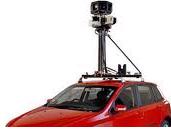Street View
Google gets maximum fine after 'impeding' privacy probe
 Google Inc. "impeded" and "delayed" a U.S. inquiry into its data-collection practices, according to the latest in a series of regulatory probes of the company's privacy practices.
Google Inc. "impeded" and "delayed" a U.S. inquiry into its data-collection practices, according to the latest in a series of regulatory probes of the company's privacy practices.
The Federal Communications Commission is seeking a $25,000 fine after examining how Google gathered personal e-mails, text messages and other materials through its Street View location service, the agency said in an April 13 filing. That is the maximum penalty for failure to cooperate with an investigation, Tammy Sun, an FCC spokeswoman, said in an interview yesterday.
The company has come under mounting scrutiny from regulators over how it handles information. In October 2010, the U.S. Federal Trade Commission ended its investigation of Street View after the company said it would improve privacy safeguards. Last year, Google agreed to 20 years of independent privacy audits to settle claims with the FTC that it deceived users and violated its own privacy policies with the Buzz social network.
"Google unlawfully intercepted and stored millions of wireless communications from Wi-Fi routers," said Marc Rotenberg, executive director of the Electronic Privacy Information Center, which requested the FCC investigation. "We believe that is a violation of the federal wiretap act."
The Washington-based policy group, which focuses on consumer-privacy issues, plans to ask U.S. Attorney General Eric Holder to investigate, Rotenberg said yesterday. Some U.S. lawmakers echoed that sentiment today.
Payload data
For three years starting in May 2007, Google collected content from wireless networks that wasn't needed for its location-based services, according to the FCC filing. Google gathered so-called payload data, including e-mail and text messages, passwords, Internet-usage history and "other highly sensitive personal information," the FCC said.
"It was a mistake for us to include code in our software that collected payload data, but we believe we did nothing illegal," Google said in an e-mailed statement yesterday. "We have worked with the relevant authorities to answer their questions and concerns."
Google's shares fell 2.3 percent to $610.19 at 2:27 p.m. in New York. The stock earlier slid as low as $601.66 amid a wider drop in technology shares.
Google disputes filing
Google, the world's most popular search engine, has 30 days from the FCC's April 13 notice to contest or pay the proposed penalty, issued for what the agency called "noncompliance" with a probe under way since 2010. The company disputed the agency's "characterization of our cooperation," and said in its statement it "will be filing a response."
The FCC said it had decided not to penalize Google for the Street View activities, saying communications and wiretap law were unclear and a Google worker the agency identified as "Engineer Doe" had declined to testify.
"There is not clear precedent," the agency said in the filing. In addition, "significant factual questions" couldn't be answered without the engineer's testimony, the FCC said.
The Justice Department should investigate and Congress should review whether laws need to be updated, Senator Richard Blumenthal, a Connecticut Democrat and member of a Judiciary Committee panel that reviews technology privacy issues, said in an interview.
"I'm troubled that Google failed to cooperate," said Blumenthal, who investigated Street View as a state official in 2010. "I'm concerned that federal agencies have declined to do more."
'Mere slap on wrist'
Representative Ed Markey, a Massachusetts Democrat, said "more needs to be done" to investigate Google. The company based in Mountain View, California, recorded $37.9 billion in revenue last year.
"This fine is a mere slap on the wrist," Markey said in an e-mailed statement. "Coupled with the company's recent changes to its privacy policy, it seems as if Google is making a U-turn in its commitment to protect consumer privacy."
Google violated FCC orders by delaying its search for e- mails, by failing to identify employees and by not verifying the accuracy of its submissions, falling "well short of what we expect and require," the agency said. Google didn't fully respond until September to a query from the preceding December, the FCC said.
In May 2010, Google said it would stop using Wi-Fi information for Street View, which displays pictures of streets on Google Maps.
Other investigations
Canada, France and the Netherlands have determined Google violated data protection, online privacy or similar laws and regulations, the FCC said in its filing. Regulators outside the U.S. found that Google had harvested personal e-mails, as well as financial and health records, Rotenberg said.
Google has come under scrutiny for how it uses data in other cases. The FTC is examining whether Google deceived consumers by planting so-called cookies on Apple Inc.'s Safari browser, bypassing privacy settings in the Apple software, a person familiar with the matter said last month.
Also in March, customers sued the company, claiming they were deceived by new privacy rules merging separate policies for about 60 services into one. The National Association of Attorneys General sent a letter to Google Chief Executive Officer Larry Page Feb. 22 signed by 36 attorneys general criticizing the new policy.
While the FCC fine will have little financial effect, it's a bigger setback in the court of public opinion, said Greg Sterling, an analyst at Opus Research.
"This contributes to an image problem," Sterling said in an interview. "Many lawmakers and regulators have a negative view of Google, and this just reinforces that."
(Published by Bloomberg - April 16, 2012)